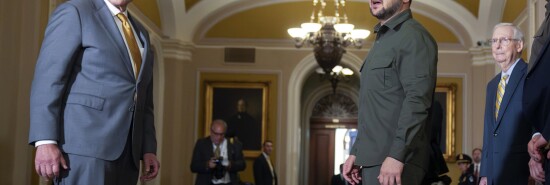
Zelensky returns to Capitol Hill in plea for continued assistance amid funding fight
Emily Jacobs Cami Mondeaux
Video Embed
Ukrainian President Volodymyr Zelensky returned to the Capitol on Thursday for the second time since Russia launched its military invasion last February.
Zelensky gathered with around 70 senators and members of House leadership to appeal for continued aid as the fate of President Joe Biden’s request for $24 billion in additional Ukraine funding remains unclear. The Ukrainian leader projected optimism to lawmakers and reporters, despite his visit occurring on the heels of an expected government shutdown and amid fraying support from House Republicans for U.S. involvement in the conflict.
HOUSE GOP LEADERS SIGNAL POSSIBLE FUNDING BREAKTHROUGH WITH CONSERVATIVE HOLDOUTS
House Speaker Kevin McCarthy (R-CA), facing a rebellion from the right flank of his conference that opposed Ukraine funding, hosted Zelensky in his office alongside committee and party leaders from both sides. The House speaker did not allow official photographers in the room, and he did not post about the meeting on social media.
He also declined to join House Minority Leader Hakeem Jeffries (D-NY) outside the Capitol to greet Zelensky upon his arrival.
McCarthy confirmed he turned down Zelensky’s request for a joint session of Congress, which former House Speaker Nancy Pelosi (D-CA) granted him during last year’s visit, though the GOP leader argued that the move was related to time constraints.
“Zelensky asked for a joint session. We just didn’t have time,” McCarthy said Thursday. “He’s already given a joint session, so what we’re doing for Zelensky is exactly the same thing we did for the prime minister of [the United Kingdom] and the prime minister of Italy. I always bring when leaders come in … a bipartisan group of leadership together.”
House Foreign Affairs Committee Chairman Michael McCaul (R-TX), a staunch Ukraine supporter, explained after the meeting that Zelensky needs “two things in particular: air cover, or the F-16s, and the attackers need a longer-range artillery to hit Crimea, where the Iranian drones are coming out of. He doesn’t have that. Right now, his troops are going in with no air cover.”
“They have to take the mines by hand at nighttime,” he continued. “We wouldn’t send our troops into that situation. So we need to give them everything they need. If this administration won’t give it to them, then I submitted that we write in our appropriations.”
“They need it and they’re gonna get it,” McCaul said of the $24 billion aid request. “The majority of the majority support this. I know there’s some dissension on both sides, but a war of attrition is not going to win this.”
Unlike on the House side, Zelensky was met with the same warm embrace he received last year in the Senate, where a supermajority of both parties back U.S. support for Ukraine.
Senate Majority Leader Chuck Schumer (D-NY) and Minority Leader Mitch McConnell (R-KY) walked beside Zelensky as he entered the upper chamber. The two leaders hosted Zelensky for an all-senators meeting on the war in the Old Senate Chamber, which nearly three-quarters of the members attended.
Schumer said in brief remarks to reporters after Zelenky’s departure, “There was a single sentence that summed it all up, and I’m quoting him verbatim. Mr. Zelensky said, ‘If we don’t get the aid, we will lose the war.’”
McConnell, who has championed Ukraine’s cause to naysayers in his party and the larger international community, said in a statement that he was “proud” to welcome Zelensky back to the Capitol so colleagues could have a chance “to hear from him firsthand and ask questions about the state of Ukraine’s counteroffensive.
“At the risk of repeating myself, American support for Ukraine is not charity,” he added. “It’s an investment in our own direct interests – not least because degrading Russia’s military power helps to deter our primary strategic adversary, China.”
He also shared a photo from Thursday’s visit.
Members on both sides said the meeting was positive despite concerns about House Republicans possibly blocking future U.S. assistance.
Sen. Lindsey Graham (R-SC) said Zelensky was “very warmly welcomed.” Sen. Tim Kaine (D-VA) told the Washington Examiner that there wasn’t tension in the room, though “there were questions.”
Asked about those questions, Sen. Ben Cardin (D-MD) replied, “Zelensky understands the division. What he said is that unity in his country has been a formula for success and he hoped there would be unity in the United States.”
Skeptics did not appear particularly moved by Zelensky or the Wednesday evening briefing they received on the status of Ukraine’s counteroffensive.
Sen. Josh Hawley (R-MO), who opposes U.S. involvement in Russia’s war, said Zelensky’s visit did not change his calculus, citing Defense Secretary Lloyd Austin telling senators at the briefing that the U.S. will need to invest another $100 billion “in order to help end the stalemate.”
“I see no path to any resolution at all,” he explained.
Sen. J.D. Vance (R-OH), another critic of U.S. support for Ukraine, sent a letter to Office of Management and Budget Director Shalanda Young after the briefing vowing to oppose additional aid. It was cosigned by five of his Senate GOP colleagues and 28 House Republicans, though not Hawley.
CLICK HERE TO READ MORE FROM THE WASHINGTON EXAMINER
“Yesterday at a classified briefing over Ukraine, it became clear that America is being asked to fund an indefinite conflict with unlimited resources,” Vance wrote on X, the social media site formerly known as Twitter, while sharing the letter. “Enough is enough. To these and future requests, my colleagues and I say: NO.”
Sen. Marco Rubio (R-FL), a Russia and China hawk who has advocated Ukraine assistance, told the Washington Examiner that he believes Zelensky’s visit “helped reinforce to those who are supportive and answered some questions. I don’t know if it changes minds. Maybe it did. I can’t speak to that, but I thought it was good that he came.”
David Sivak contributed to this report.
